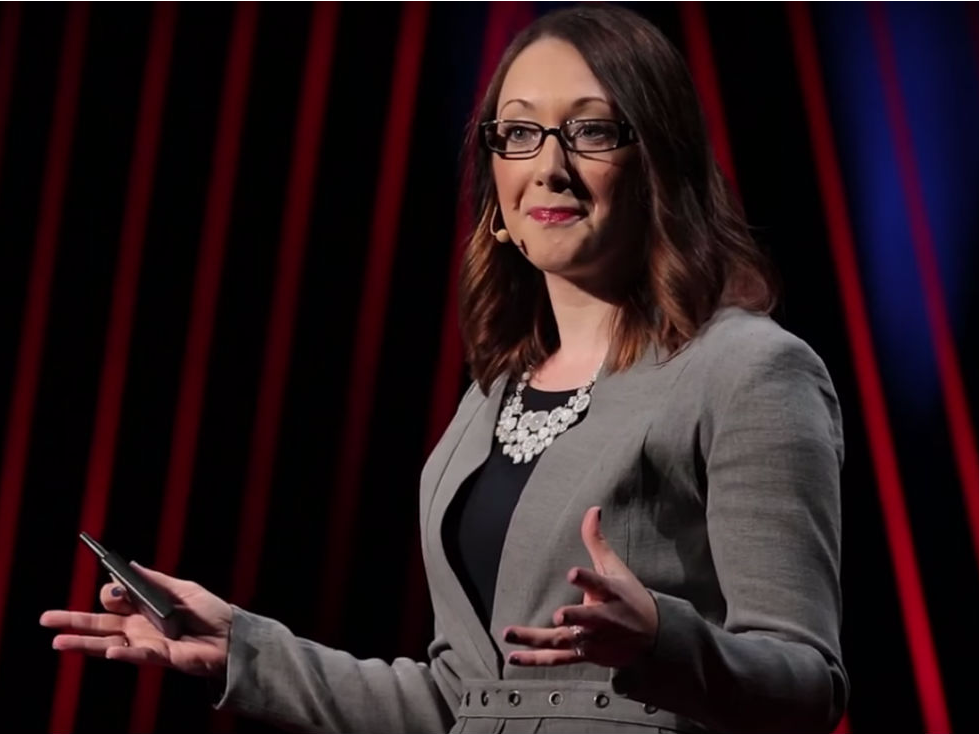The psychological secret to not being a jerk

YouTube / TEDx Talks
About 95% of people think they have good self-awareness, whereas only about 10-15% of us actually possess this skill.
It's a bit like how research has shown how 80% of participants in a study think of themselves as an "above average driver" — it's just not the case.
This finding is the result of over three years of research by organisational psychologist Dr Tasha Eurich. She is a coach, speaker, and author, who has spoken in many countries all over the world and dedicated her career to turning people into better leaders.
In her new book Insight, Eurich discusses how we are generally very bad judges of ourselves. And that's a shame because it can be a potent workplace tool, she thinks.
People who know what drives them, know what their passions are, and understand the impacts they have on the people around them, are more effective. They also seem to be promoted more quickly and have more financially successful businesses.
She worked with many of the Fortune 500 companies, including Microsoft, T-Mobile and Walmart, and conducted her own three-year study to understand what self-awareness really is.
Business Insider spoke to Eurich to learn why self-awareness is so important and what her tips are for someone who wants to be better at it. It's a very complex and nuanced topic, but this is what she recommended for someone looking to "start their journey."
Why you're probably not self-aware
About four years ago, Eurich noticed how most people who think they have self-awareness actually don't, and this was hurting their businesses.
She found from her own studies and previous research that a common theme is the more power you get and the higher you ascend, the less self-aware you become. This is why she saw a lack of self-awareness quite a lot in unicorn companies which took off suddenly and exponentially.
She found from her own studies and previous research that a common theme is the more power you get and the higher you ascend, the less self-aware you become.
"The power literally goes to our heads and it makes it difficult for us to understand the impact we're having on other people to take their perspectives," she said.
One example she gave was Uber CEO Travis Kalanick. "He's driven out his president, he's driven out his chief marketing officer, that is like a classic case of a lack of self-awareness," she said.

Reuters Staff
Eurich explained that if a CEO is smart, even brilliant, but they have no idea how other people perceive them, eventually they will derail. She said that's she is often brought into companies because the CEO is "not behaving."
"At the very least they are going to be ineffective because they can't get people to want to follow them," she said. "A lot of times, un-self-aware leaders at the top that I see who suffer from that problem. They're not respected, they're not effective because they can't get people to jump on board."
Also if a CEO isn't clear about what drives them, it's a missed opportunity, and this can become problematic when they have to explain their vision. "A lot of times they blindly chase shareholder returns, and it's just so short sighted and it doesn't ultimately help them be effective," Eurich said.
Why self-awareness matters
In many cases, Eurich's clients were successful in spite of their behaviour, or lack of self-awareness. In these cases, they might not see any reason to change how they act — after all, they're very powerful the way they are. But Eurich says there will always come a time when you learn how important it is to understand those around you.
"Ultimately there's a crisis or a moment of opportunity where you need to listen to the people around you," she said. "Or you make a giant mistake and you've got to eat crow and come clean, and sort of be vulnerable and courageous."
Often when Eurich explains to those in charge how people really perceive them, they are shocked. She jokes that she gets paid to tell really powerful people the truth when everyone else is afraid to. But when she starts to see a change in their management styles, it's quite remarkable.
"The higher up you go, a dramatic turn around in self-awareness from one person literally has a ripple effect all the way to the customers and the shareholders," she said.
3 steps to improving self-awareness
Self-awareness is impossible to achieve overnight, but these are the three steps Eurich recommended as a good place to start:
1. Commit to learning the truth about yourself.
Even if the truth is scary or intimidating, choose to face up to yourself. Stop trying to see yourself through rose-tinted spectacles, and question the assumption that just because nobody is challenging you on your decisions, that everything you're doing is right. Being open-minded, Eurich says, makes you braver and wiser.
2. Find a "loving critic."
This is someone who you trust and who you know wants you to be successful. However, it has to be someone who will also be completely honest and direct with you. You could find a board member or someone on your level who knows you really well, ideally who sees you every day. Ask them what you're doing well and what you're not, and you might be surprised how insightful it is.
3. Think about getting a coach.
There are many amazing executive coaches, Eurich says, but there are also a lot of really terrible ones. If you find someone who can help you evaluate the perceptions of yourself in your company, and help you plan a couple of things to work on, you might see some dramatic improvements.
NOW WATCH: A CEO and former Googler shares 2 tricks for cold emailing anyone
See Also:
9 tips from a self-help expert on how to stay positive when you feel anything but
This simple email mistake could make everyone in your office hate you
SEE ALSO: These are the psychological reasons why some people are always late

 Yahoo News
Yahoo News 

